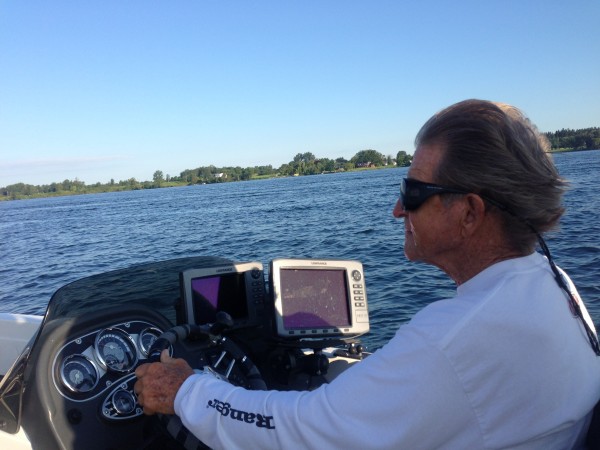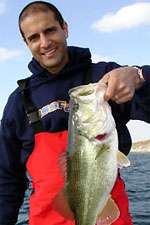
Editor’s note: Our friend and bass fishing legend Dick Garlock passed away this week, on Oct. 8, 2019, at 90 years young. He looked like he was 60. We’re going to miss him fishing and working at our tournaments. Here’s what Roland Martin said about Garlock on Facebook, “Dick was a great guy. I tried to call him a few days ago and left a message. I admired his tenacity more than anyone I’ve ever met. He was the toughest guy as far as external toughness. Cold weather, rain, rough water, he could handle all of those adversities better than anyone I’ve ever met. He was the hardest fishing, hardest working guy I’ve ever been with. He has just a wonderful time traveling, diving, and fishing tournaments. The main thing that keeps sticking out the me is his toughness and ability to remain to the point as a way to figure out what he needed to do. I always looked up to him and took my work ethic from him. I will certainly miss him a great deal. Going into winter, I will be thinking of him as he would sometimes spend the whole winter with me on Lake Okeechobee.” The story below was written in 2013.
At 82 years old (but you’d never know it), Dick Garlock still fishes tournaments, still yanks up his trolling motor and still can whip you in a fight…on the water. He’s won more tournaments on and around the St. Lawrence River than he can remember and is a certified legend there.
But he’s much more than that.
In everything, there are pioneers. In bass fishing, we have names like Roland Martin, Ray Scott, Al and Ron Lindner, Tom Mann – a pretty long list of names just about everyone who’s ever used a baitcaster knows. But have you heard of Dick?
An article won’t do any pioneer justice, but here are a few stories about him that should give you a good idea of Dick’s contribution to our sport.
The beginning: a spinnerbait
How do you get into bass fishing when there’s no bass fishing yet? For Dick, the answer is spinnerbaits.
“The first time I heard about these [bass] tournaments, I was like, ‘Boy, what crazy thing will people do next?’ They were coming out with bass boats, coming back and weighing in fish– it was crazy. I’d never heard such a thing.
“Then a fellow named Bill Rutherford introduced me to a spinnerbait,” he said. “Up until then, we’d always used live bait. One day my father and I were fishing a place called Grassy Island, and I said to him, ‘I’m going to throw this.’ He thought I was crazy – it was a crazy-looking thing – but I was catching one fish after another.
“People [on the river] were coming up to us and saying, ‘What is that thing? What is that thing?’ It was a spinnerbait – that was in the ’70s.”
One more “thing” is the first tournament he fished, on Black Lake [N.Y., by the St. Lawrence], he won.
But in his second tournament he got a tip from a friend, convinced his boater to go that spot (requiring two lockages); they caught nothing, and when his boater finally hooked a fish at a spot on the way back to the ramp, Dick managed to knock it off with the net.
Hangin’ with Roland
The next phase of Dick’s route to bass fishing legend status came when he ran into a killer stick named Roland Martin. Dick was at a B.A.S.S. Nation tournament in Missouri, and he got to talking with Roland about that lake and the St. Lawrence River – because the Bassmaster Classic was headed there. They agreed to trade info.
“He helped me in that tournament, and I didn’t do any good really,” Dick said. But Roland finished second at that 1980 Classic, his best Classic finish ’til that time and still his best Classic finish ever.
 Dick said Roland’s wife then contacted him, and suggested the two anglers team up. They talked, and “he said, ‘You do a lot of looking for fish because I have to do TV shows and stuff like that, and I’ll be looking, too,'” Dick said. “‘Then we’ll share [information]. In the tournaments, you can fish anything you want anytime, and I will too.’ And we always did that.'”
Dick said Roland’s wife then contacted him, and suggested the two anglers team up. They talked, and “he said, ‘You do a lot of looking for fish because I have to do TV shows and stuff like that, and I’ll be looking, too,'” Dick said. “‘Then we’ll share [information]. In the tournaments, you can fish anything you want anytime, and I will too.’ And we always did that.'”
Pioneering ways
I asked Dick for three things he thought he brought to the bass fishing world, and here’s what he said:
- “Sharpening hooks. People never used to sharpen hooks. I used to sharpen them triangularly.”If you take a round point and push it into leather, it has to force the leather apart [to penetrate]. A triangular-shaped hook slices the leather. It cuts it, so you don’t need as much force.”I sharpened my hooks with a file. Now I don’t sharpen every hook because some are really sharp, like most of the Gamakatsu hooks.”
- “I think I was the first one to have a foot throttle. But I also could use the hand throttle so I could stand up and look.”
- “I was the first one, I believe, to use a long rod. Most guys were using [short] pistol-grip rods, but mine was like 7 feet. I had to have two or three made for me [because they weren’t sold at the time].”I used them because I figured I had better leverage on the fish, I could cast farther, and I could keep the fish from going under the boat when they got close. I really liked those rods – I guess a lot of other people have them now.”
Then to now
The biggest change he’s seen from back then to now is electronics. “They’re a lot better,” he said. Anglers “know what they’re doing [under the water] rather than just guessing.”
Even so, he still has bow and stern flashers “because they show the bottom right away. Depthfinders sometimes don’t register right away.”
He also said that now there’s “a lot more fishermen fishing a lot better.”
Fishing the St. Lawrence
Elite Series fishermen for the most part fished deep on the St. Lawrence. If he fished that tournament, Dick said, “I’d fish deep but would fish shallow, too. A lot of big fish are shallow.
“You’ll look out there [shallow] and won’t see anything, then all of a sudden you’ll see two big black fish come along. If they see you, they probably won’t bite. You have to cast way ahead of them on the flats.
“If they see you, they’ll get ahead of your boat and keep going. And they’ll pick up the other ones [swimming along] so then they’ll all be ahead of you. Keep casting ahead of the boat – but sometimes you’ll see them behind you.
“When they get to the edge of their territory, they disappear. What you can do is just go back to where you started, and you’ll find them.”
Bait wise, he’ll drop shot from 2 feet to way out deep, and prefers to “let the current move the bait” rather than giving it action, he said. He also uses swimbaits, spinnerbaits, jerkbaits and lipless crankbaits, but regular lipped crankbaits “don’t seem to work well.”
Enjoying himself
When we left the St. Lawrence, Dick was scheduled to fish two tournaments the next week. He still fishes them because “it’s just fun,” he said. “Everybody wants to win, but I don’t worry too much about it. I never did.
“Once I missed making the Classic by 2 ounces. Hank Parker said to me, ‘Wow, I don’t know how you can handle that. You must be in tears.’ I said, ‘What do you mean?’ He said, ‘You were so close. What are you going to do?’
“I said, ‘I’m going to go home, fish a little and enjoy myself.'”

